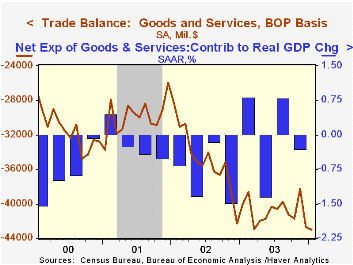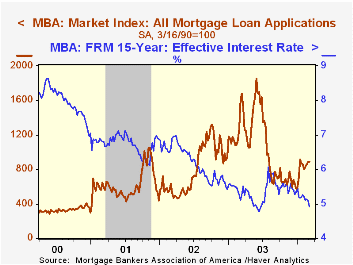 Global| Mar 10 2004
Global| Mar 10 2004U.S. Trade Deficit Set New Record
by:Tom Moeller
|in:Economy in Brief
Summary
The U.S. foreign trade deficit set a new record in January. It deepened sharply to $43.1B versus December's deficit of $42.7B which was little revised. Consensus expectations had been for a deficit of $41.5B. Exports fell a sharp 1.2% [...]

The U.S. foreign trade deficit set a new record in January. It deepened sharply to $43.1B versus December's deficit of $42.7B which was little revised. Consensus expectations had been for a deficit of $41.5B.
Exports fell a sharp 1.2% (+8.5% y/y) following a 0.6% December decline which was revised slightly. Lower exports of foods, feeds & beverages paced the January decline and fell 7.9% following a 4.6% December drop.
Exports of capital goods fell 0.8% (+12.6% y/y) after the 4.5% December plunge. Non-auto consumer goods exports also fell for the second month, off 2.1% (+5.8% y/y).
Imports fell 0.5% and it was broad based. Capital goods imports dropped for the second consecutive month (+12.6% y/y). Imports of non-auto consumer goods again fell hard versus the November peak (+5.8% y/y).
Non-petroleum imports fell 1.5% (+7.5% y/y). The value of petroleum imports rose another 6.1% (+13.1% y/y) as crude oil prices rose (+3.0% y/y).
By country, the US trade deficit with China deepened to $11.5B ($123.9B in 2003). The US trade deficit with Japan improved m/m to $5.3B ($66.0B in 2003) and the deficit with the European Union fell to a low $5.9B ($94.3B in 2003) as imports plummeted 20.1% m/m.
Exchange rate analysis from the Federal Reserve Bank of New York is available here.
| Foreign Trade | Jan | Dec | Y/Y | 2003 | 2002 | 2001 |
|---|---|---|---|---|---|---|
| Trade Deficit | $43.1B | $42.7B | $40.0B(1/03) | $489.9 | $418.0B | $357.8B |
| Exports - Goods & Services | -1.2% | -0.6% | 8.5% | 4.6% | -3.3% | -5.8% |
| Imports - Goods & Services | -0.5% | 3.1% | 8.2% | 8.4% | 2.0% | -5.5% |
by Tom Moeller March 10, 2004

The index of mortgage applications compiled by the Mortgage Bankers Association rose 1.2% last week for the fourth consecutive weekly gain.
The effective interest rate on a conventional 30-Year mortgage dropped to 5.61% from 5.75%, the lowest level since last June. The effective rate on a 15-year mortgage fell to 4.92%.
Purchase applications rose 1.4% w/w (+24.2% y/y) and started the month 3.1% ahead of the February average.
During the last ten years there has been a 55% correlation between the y/y change in purchase applications and the change in new plus existing home sales.
Applications to refinance rose 1.0% (-60.0% y/y) for the fourth consecutive weekly gain.
The Mortgage Bankers Association surveys between 20 to 35 of the top lenders in the U.S. housing industry to derive its refinance, purchase and market indexes. The weekly survey accounts for more than 40% of all applications processed each week by mortgage lenders. Visit the Mortgage Bankers Association site here.
| MBA Mortgage Applications (3/16/90=100) | 03/05/04 | 02/27/04 | 2003 | 2002 | 2001 |
|---|---|---|---|---|---|
| Total Market Index | 889.1 | 878.7 | 1,067.9 | 799.7 | 625.6 |
| Purchase | 428.6 | 422.6 | 395.1 | 354.7 | 304.9 |
| Refinancing | 3,567.6 | 3,532.2 | 4,981.8 | 3,388.0 | 2,491.0 |
Tom Moeller
AuthorMore in Author Profile »Prior to joining Haver Analytics in 2000, Mr. Moeller worked as the Economist at Chancellor Capital Management from 1985 to 1999. There, he developed comprehensive economic forecasts and interpreted economic data for equity and fixed income portfolio managers. Also at Chancellor, Mr. Moeller worked as an equity analyst and was responsible for researching and rating companies in the economically sensitive automobile and housing industries for investment in Chancellor’s equity portfolio. Prior to joining Chancellor, Mr. Moeller was an Economist at Citibank from 1979 to 1984. He also analyzed pricing behavior in the metals industry for the Council on Wage and Price Stability in Washington, D.C. In 1999, Mr. Moeller received the award for most accurate forecast from the Forecasters' Club of New York. From 1990 to 1992 he was President of the New York Association for Business Economists. Mr. Moeller earned an M.B.A. in Finance from Fordham University, where he graduated in 1987. He holds a Bachelor of Arts in Economics from George Washington University.
More Economy in Brief
 Global| Feb 05 2026
Global| Feb 05 2026Charts of the Week: Balanced Policy, Resilient Data and AI Narratives
by:Andrew Cates






